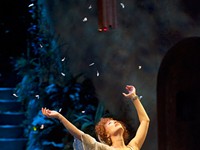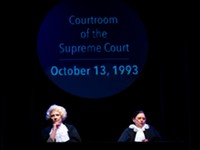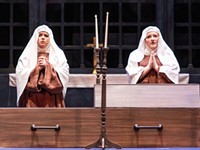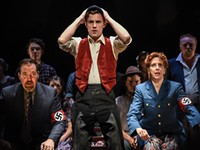[
{
"name": "500x250 Ad",
"insertPoint": "5",
"component": "15667920",
"parentWrapperClass": "",
"requiredCountToDisplay": "1"
}
]
America's characteristic sound is restless and just off the beat, especially in the loose, driving textures of ragtime, jazz, and the blues, shrewdly borrowed by the musical chameleons of Tin Pan Alley. The U.S.A. in the 20th century came to be syncopation's natural habitat. This summer, though, the Shaw Festival, just over the border in Niagara-on-the-Lake, Ontario, has picked up on it. Although four of the five plays I recently saw there are British, and despite their being purposely out of whack in some way, differences in tone, manner, and purpose keep them from lining up with one another — a kind of serendipitous syncopation.
I went to "Ragtime" (in the Festival Theatre, through October 14) without much eagerness, because I was seeing librettist Terrence McNally, composer Stephen Flaherty, and lyricist Lynn Ahrens' 1996 musical for the third time. But aside from "The Crime of the Century" and "Buffalo Nickel Photoplay, Inc.," two disappointing production numbers that lacked the comic flamboyance they need, the production is absolutely smashing. It fills the stage with color and movement, yet is also true to the darker spirit of the E.L. Doctorow novel from which it comes.
The score's rambunctious rhythms punctuate three syncopated stories that exemplify the uplifting optimism of becoming American, as well as the rage of America's racial tragedy. They interweave against a background of explosive social change as the 20th century arrives: Father and Mother, living more-or-less contentedly in New Rochelle; Tateh and his daughter, desperate Jews newly arrived from Latvia; and Coalhouse Walker, Jr. and his beloved Sarah, African-Americans whose search for dignity triggers the violence that presages an age of technological wonder and horror. Such figures as J. P. Morgan, Emma Goldman, and Booker T. Washington also appear to articulate a world view that is, ironically, only a decade from extinction.
Patty Jamieson's performance as Mother is her richest and most nuanced in 16 years at Shaw. Jay Turvey brings to Tateh a sweetness of character along with determination and drive. At the play's emotional center, though, are the prideful, ambitious Coalhouse, majestically performed by Thom Allison, and Sarah, played tenderly by the lovely Alana Hibbert.
Director Jackie Maxwell has shaped this emotionally varied, thematically diverse play masterfully. Sue LePage's set of industrial scaffolding is expansive yet ominous, while her elegant costumes, especially for the women, exemplify the period. Alan Brodie's lighting evokes the play's shifting atmosphere.
Githa Sowerby is virtually unknown today, yet in her time, she was George Bernard Shaw's friend, a well-known feminist reformer, and an admired playwright. "A Man and Some Women" (in the Court House Theatre, through September 22), the third of her plays revived by the Shaw since 2004, is a powerful domestic drama in which affections wither because respectable women, denied the freedom to support themselves, are forced into dependence. In such circumstances, Sowerby argues, souls shrivel and love dies.
Richard Shannon has foregone his desire to join a scientific expedition because he accepted the burden of supporting his mother, wife, and two unmarried sisters. With the mother's death, assumptions long dormant suddenly surface. Only Shannon knows that things will be worse rather than better, but he is prepared to meet his obligations. Complicating his life is his love for his cousin Jessica, a New Woman who is self-sufficient and thus capable of a true, loving relationship with a man. When Shannon determines to leave his wife, Jessica must choose whether to accept him or insist on her independence — for his sake as well as hers.
Although the plot is familiar, conventional assumptions about responsibility and independence receive a thorough shaking. Sowerby's keen intelligence and sharp writing take nothing for granted. The play's characters are finely drawn, and a sense of crisis builds surely and intensely. Alisa Palmer's direction is sharp yet patient, and the excellent cast creates a sense of inevitably interwoven with the shocks that unhinge the family. Graeme Somerville is decent, driven, and loving as Shannon. Kate Hennig plays one unmarried sister with cold resentment while Sharry Flett plays the other with rueful honesty about her uselessness. Marla McLean's Jessica is warm but insistently honest in her perception of what is real and good.
Shaw's "Misalliance" (in the Royal George Theatre, through October 27) sets up a series of "misalliances" involving couples mismatched for romance, marriage, politics, business, adventure — everything, it seems, except sex, especially after Lina Szczepanowska arrives at the home of self-made millionaire John Tarleton and his family, courtesy of a very funny plane crash. By the end, every relationship is properly arranged, rearranged, or discarded. The play is one of the best examples of Shaw's non-stop talk, a series of duets, trios, and quartets that work their way brilliantly through matters of head and heart. The second act is more smartly done than the first because it has a lot more drive as things come to a head.
Director Eda Holmes felt a misguided need to move the play from 1910 to 1962, because both were times of great change. Although she ticks off the similarities in a program note, a list isn't a reason. As with synonyms, the differences are what matter. The result is instant — and useless — anachronism that clutters up an already busy play. Thom Marriott as Tarleton, the always-admirable Peter Krantz as the father-in-law-to-be of Tarleton's daughter, and Tara Rosling as Lina lead the cast with strong comic performances.
Garry Essendine is Noel Coward's parody of himself. In "Present Laughter" (in the Festival Theatre, through October 28) Coward has spun an accelerating farce-like story around a theatrical star whose egomania is funny rather than horrid, even though he has a genius for complicating his life as well as the lives of those who care about him. The story, such as it is, involves an almost ex-wife, a loyal secretary, a worshipful (if hysterical) aspiring playwright, a friend's wife who wants to seduce him, an unflappable valet, and a talentless ingénue. It's the kind of frothy filigree that requires perfection from director and cast. It doesn't get it here. Director David Schurmann has broadened and thus flattened the play's delectable mix of farce and high wit. The one thing Essendine (played by Steven Sutcliffe) must be is suave, and it's the one thing he isn't. His looking in the mirror whenever the doorbell rings becomes tiresome and reveals little. Jonathan Tan's excessive clowning as playwright Roland Maule, though very funny, makes him a buffoon whose role in Coward's comic construction disappears. Where the excess is brilliant is in William Schmuck's design for Essendine's "Moderne" apartment.
Playwright Terence Rattigan's reputation is on the rise after years of neglect. That's good news. But "French without Tears" (in the Royal George Theatre, through September 15), the play that first brought him notice in 1936, is slight and dated. With the exception of Schmuck's costumes for Robin Evan Willis, the production lacked charm, wit, and sexiness. It was so boring that it soon became hard even to guess what a stronger company might have made of it.
Latest in Theater
More by Michael Lasser
-

THEATER REVIEW: 2013 Shaw Festival
Aug 7, 2013 -

THEATER: 2013 Shaw Festival
Jul 31, 2013 -

Stratford Festival
Jun 12, 2013 - More »






